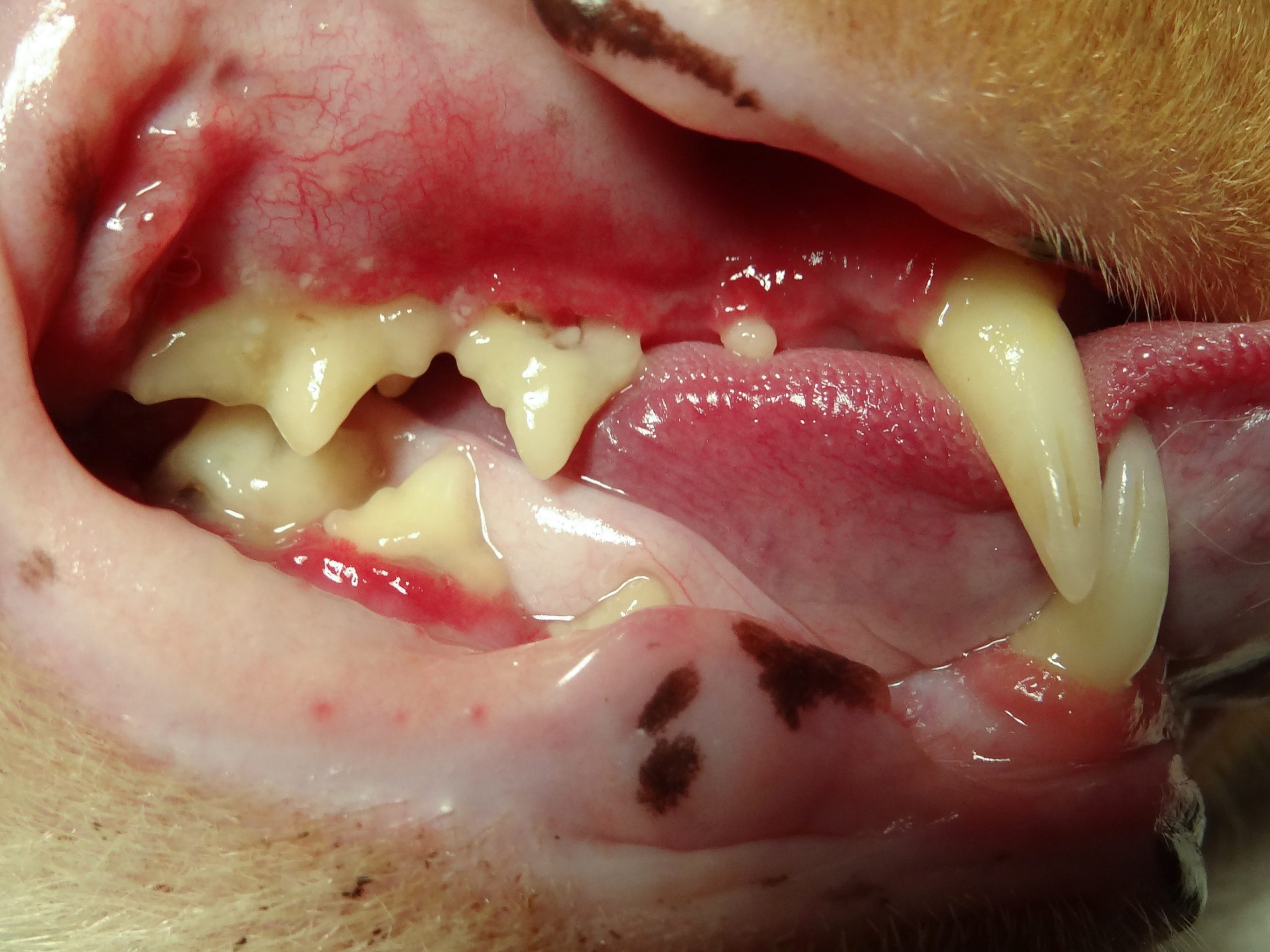The Video Above Demonstrates Quadrant Extraction for
Cat Feline Stomatitis
Please Click the Video to Watch Now &
Sign up for Free Online Dentistry Training
Feline Stomatitis is a common oral condition that affects cats and can cause severe pain and discomfort. The condition is characterized by inflammation and ulceration of the gums, tongue, and inner cheek lining. The exact cause of feline stomatitis is not well understood, but it is believed to be an immune-mediated disorder.
Treatment for feline stomatitis can be challenging and often requires a combination of approaches, including dental cleaning, antibiotics, and anti-inflammatory medications. In some cases, more aggressive treatment such as dental extractions or immune system suppression may be necessary.
If your cat is showing signs of feline stomatitis, such as drooling, difficulty eating, or bad breath, it is important to seek treatment from a veterinarian with experience in treating this condition. One such location is the Veterinary Dental Center of Atlanta, which excels in dental care for pets and has experience in treating feline stomatitis.
Feline Stomatitis in cats, represents a painful and therapeutically frustrating oral condition.
Chronic gingivostomatitis or CGS is another recent term to describe Feline Stomatitis in Cats. Characteristic lesions are recognized as severe inflammation adjacent to the premolar and molar teeth (Figure 1) with inflammation of the caudal oral mucosa lateral to the palatoglossal folds (Figure 2) The caudal mucosa classically been incorrectly termed faucitis and if bilateral is pathognomonic for feline stomatitis. Patients experience a wide variety of clinical signs including anorexia, blood tinged saliva, food dropping, lethargy, weight loss, halitosis and bruxing. Radiographic changes include no changes to evidence of bone loss, tooth resorption and tooth fracture.

Severe inflammation associated with the gingiva and mucosa adjacent to the molars and premolars

Caudal oral mucosa inflammation
The cause of feline stomatitis is not completely understood. Antigenic overstimulation of the individual cats immune response is the basis for the disease. Studies have shown no correlation with any virus with the exception of calicivis.
Prognosis with Extraction
Caudal or complete extractions is the treatment of choice for Feline Stomatitis. (Figure 3 and 4) Studies suggest that cats that undergo extractions respond favorably 80% of the time, requiring no further therapy. (1) Unfortunately the remaining 20% of cats require some degree of additional therapy to eliminate pain and/or control persistent inflammation in cases non-responsive to caudal mouth or full mouth extractions.

Severe inflammation associated with the gingiva and mucosa adjacent to the molars and premolars

Caudal oral mucosa inflammation
Historical Therapy
Various modes of therapy have been used to attempt to alleviate pain and inflammation in cats that are refractory to surgical removal of the premolars and molars in cases of feline stomatitis in cats. Aurothioglucose, thalidomide, bovine lactoferrin, cyclosporin, chlorhexidine and glucorticoid topical gels, chlorambucil, megestrol acetate, prednisone, hypoallergenic diets and laser therapy have all been used with some degree of success in certain cases. Injectable glucocorticoids have been successful as a palliative treatment however they appear to lose their efficacy with repeated use and potentially pose significant deleterious effects to the patient. It must be stressed that all teeth should be examined for disease and any canines and incisors that are abnormal or have adjacent stomatitis should be considered for extraction as well.
Pain Management
Cats with chronic gingivostomatitis are extreme examples of patients with severe chronic pain states. Preoperative, intraoperative and postoperative mediation of peripheral and central sensitization mechanisms play a large role in the ability to properly manage pain in these patients. Loading doses of buprenorphine and ketamine are following by continuous rate infusions of both agents for several hours before surgery and tapered following surgery and prior to discharge. Regional nerve blocks are always administered prior to surgical manipulation. Proper NSAIDS should be utilized pre and postoperatively if possible, depending upon the patients drug history and biochemical profile results. Gabapentin, fentanyl patches+/- NSAIDS and gabapentin are ideal for immediate postoperative comfort.
Client Education
Client education is essential regarding the potential for non-response to initial extractions. Cat guardians should be aware that some patients do not respond at all and require adjunct therapy. Expense is significant in both initial and follow-up therapy for refractory cases and should be discussed in detail.
The Video Above Demonstrates Quadrant Extraction for Feline Stomatitis in Cats
Please Click the Video to Watch Now &
Sign up for Free Online Dentistry Training
The veterinary literature has recently reported the use of feline recombinant interferon omega (Virbagen; Virbac) in cats with refractory stomatitis and concurrent calicivirus. In a recent randomized, multi centric, controlled, double-blind study thirty nine cats were allocated into two groups: oromucosal administration of ReFeIFN + placebo tablets / oromucosal administration of placebo + prednisolone tablets. Cats were observed during a 90-day period on D0, D15, D30, D60 and D90. Investigator assessment indicated complete cure and marked improvement occurred in 45% of cats in the interferon group and in 23% of cats in the prednisolone group. Owner assessment revealed complete cure in 39% of cats in the Interferon group and in 23% of cats in the prednisolone group when assessment was made by owners. The differences between investigator and owner groups were not significant.(2)
The exact mechanism of action of feline omega interferon is not known. It is a type 1 interferon related to alpha interferon that stops viral replication by inactivation of translation proteins and destruction of mRNA. Interferons in general are antiviral cytokines that also have immunomodulatory effects. Studies show feline omega interferon has statistically significant therapeutic effects on initial clinical signs and on survival times of cats with FeLV infection and FeLV/FIV coinfection. (3)
Laser Therapy
CO2 laser therapy for proliferative tissue ablation has been used for treatment of refractory feline stomatitis. (4) One study demonstrated complete resolution following 3 sessions however the final therapy was also done at the time of rostral extractions (canines and incisors)
Cyclosporin
A recent study showed clinical efficacy of the immunosuppressive agent cyclosporin. (5) Vomiting and diarrhea are frequent side effects and cost is a deterrent for chronic use in feline patients. Blood levels vary considerably between individuals and among the various formulations of cyclosporin. Close and frequent monitoring of blood levels are needed.
Cryotherapy
Cryotherapy may prove another option for palliative treatment of feline stomatitis in cats. Two freeze thaw cycles of the affected tissue are recommended. Regional nerve blocks should be administered prior to cryotherapy to minimize any immediate postop discomfort. Personal experience with this modality has shown positive responses in almost all patients that vary in duration from 2 weeks to permanent resolution. In most cases immediate alleviation of clinical signs is noted. Patient response overal varies. Retreatment many repeated 2-4 week intervals depending upon response. Some patients may be controlled with extended intervals between treatments or may resolve completely after 1 to multiple treatments. It should be noted that if the patient does not respond after the first treatment, no further treatments are warranted.
Stem Cell Therapy
Adipose-derived stem cell therapy has been available for a variety of diseases in veterinary medicine for some time. Unfortunately, no commercially available effective therapy is available for feline stomatitis. Recent studies at the University of California at Davis demonstrated signifiant success in five out of seven cats that obtained clinical remission or complete resolution of feline stomatitis. (6) Patients were given two injections of adipose derived mesenchymal stem cells over a 30 day period. The two cats that did not respond favorably demonstrated a T-cell biomarker profile considerably different to those that did. Implications here suggest that differentiation of these two subsets based on T-cell expression could allow us to predict which cats will respond to stem cell therapy and which will likely not.
Therapeutic Efficacy of Fresh, Autologous Mesenchymal Stem Cells for Severe Refractory Gingivostomatitis in Cats
Conclusion
Feline stomatitis in cats is a frustrating disease with multiple factors contributing etiology many of which are still poorly understood. Therapy for refractory cases that do not respond to full mouth or caudal mouth extractions is available however variation in success varies considerably among patients. Stem cell therapy offers a very promising future option for therapy, possibly with a predictable measure of success not seen previously.
References
1. Hennet P, Chronic gingivo-stomatitis in cats: long-term follow-up of 30 cases treated by dental extractions J Vet Dent 14(1) 15-21, 1997
2. Southerden P, Gorrel C. Treatment of a case of refractory feline chronic gingivostomatitis with feline recombinant interferon omega. J Small Anim Pract. 48(2) 104-6, 2007
3. Hennet PR et al: Comparative efficacy of a recombinant feline interferon omega in refractory cases of calicivirus-positive cats with caudal stomatitis: a randomised, multi- centre, controlled, double-blind study in 39 cats. Journal of Feline Medicine and Surgery (2011) 13, 577-587
4. Lewis JR, Tsugawa AJ, Reiter AM. Use of CO2 Laser as an Adjunct Treatment for Caudal Stomatitis in at Cat. J Vet Dent. 2007; Vol 24:4; pp 240-249,
5. Lommer MJ. Efficacy of Cyclosporine for Chronic, Refractory Stomatitis in Cats: A Randomized, Placebo-Controlled, Double-Blinded Clinical Study. Journal Vet Dent. 2013; Vol 30:1: pp 8-17.
6. Arzi B, Mills-Ko E, Verstraete FJ, Kol AW et all. Therapeutic Efficacy of Fresh, Autologous Mesenchymal Stem Cells for Severe Refractory Gingivostomatitis in Cats
Stem Cells Transl Med. 2016 Jan;5(1):75-86. doi: 10.5966/sctm.2015-0127. Epub 2015 Nov 18.

